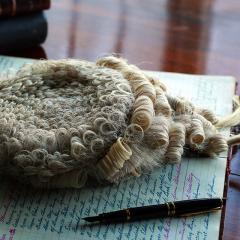Life and Death in Private Law 2.0
Life and Death in Private Law 2.0
Time and date: Thursday 22 June, 2023, 1-5pm (Brisbane Time)
Location: Law School Board Room (W353), Level 3, Forgan Smith Building, The University of Queensland, St Lucia
And via Zoom: https://uqz.zoom.us/j/84131175083
Programme
1pm–1:15pm: Dr Kate Falconer – Welcome
1:15pm–2pm: Professor Kit Barker – Suicide, Madness and the State - The Tale from Tort
2.00pm–2:45pm: Dr Andrew Fell – The Rights and Duties of Non-Living Person
2:45pm–3.00pm: Break
3.00pm–3:45pm: Dr Greg Dale – Property, Bodies and Exploitation
3:45pm–4:30pm: Professor Mark Lunney – Bereavement Damages in Australia and England in the 1930s and 1940s
Abstract
Suicide, Madness, and the State – The Tale from Tort
Professor Kit Barker (University of Queensland)
Attitudes to the taking of one’s own life are fractured, emotive and have changed dramatically over time. What was in Mediaeval times commonly seen as a public wrong or, at best, a forgivable act of madness, has come increasingly to be accepted as a matter of rational private choice and a domain into which the state should interfere only where there are good reasons to doubt the autonomy of that choice. This paper tracks the development of legal attitudes to suicide through the specific lens of the law of tort; focusing in particular on their ramifications in one particularly controversial type of case, typified by the Australian High Court decision in Stuart v Kirkland-Veenstra, in which negligence claims were lodged against state agents for their failure to exercise public powers to prevent foreseeable self-harm. The extent of the state’s duty of care in respect of suicide, this paper argues, raises key questions about the locus of control in respect of matters of life and death; about the relationship between state power and private will; and about the assumed relationship between death and rationality itself. In critiquing the High Court’s decision, it suggest that aspects of the Court’s reasoning are likely to result in too restrictive an approach being taken to the state’s duty of care outside of instances in which victims are public patients or within the state’s actual physical custody.
The Rights and Duties of Non-Living Persons
Dr Andrew Fell (University of Queensland)
This paper considers the extent to which non-living persons can and should be the subject of primary rights and duties. This raises two separate (but related) philosophical issues. One is whether rights persist after their subject’s death. Some rights clearly persist, as demonstrated by the fact that they are transmissible by will. In contrast, other rights are extinguished or replaced by other rights, and some rights that persist are nevertheless not transmissible. A second issue is whether duties can be owed to people who have not been born, and in particular, will never be born if the duty is performed. As Derek Parfit points out, this latter ‘non-identity problem’ is more pervasive than it might appear at first glance, since even minor changes in conduct can significantly affect which people will exist. The purpose of this chapter is to explore, explain, and evaluate private law’s response to the non-living.
Property, Bodies, and Exploitation
Dr Gregory Dale (University of Queensland)
When an individual dies, advances in technology permit body parts to survive. Survival could be metaphorical, in the case of von Hagens' travelling exhibition of 'plastinated' cadavers, or literal, in the case of Henrietta Lacks' immortal HeLA cells, which are used prolifically in medical research. In both cases, private law recognises ownership in a deceased's human tissues. This chapter explores the numerous paradoxes that arise from this. How can I enjoy property rights in another when I do not enjoy property rights in my own body? And is the boundary between life and death, simply the boundary between non-proprietary interests and proprietary interests, respectively?
Bereavement Damages in Australia and England in the 1930s and 1940s
Professor Mark Lunney (New England / King’s College London)
This paper will explore the question of damages for loss of expectation of life, estate actions, and bereavement damages in Australia and England in the 1930s and 40s. In line with previous work done by the author, it will argue that the way Australian courts and legislatures reacted to the changes taking place in England reveals considerable complexity, nuance and innovation in the Australian approach.
About Australian Centre for Private Law Events
The mission of the Australian Centre for Private Law is to foster the development and understanding of the private law through advanced theoretical, doctrinal, empirical and historical research, and the dissemination of that research through education and professional outreach. By supporting the work of its Fellows, the ACPL seeks to promote research in all areas of private law and to establish itself as a research centre of national and international importance. The core initiatives of ACPL are:
Research: To advance a deeper understanding of the structure, principles and policies of the private law through advanced theoretical, comparative, and empirical analysis.
Education: To promote, facilitate and disseminate the results of that research for the benefit of Australia’s social and economic fabric.
Professional Outreach: To engage the judiciary and members of the legal profession in discussion about the values, goals and methods of private law and the respective roles of the judiciary, the legal profession and the academy in the interpretation and reform of private law.
The ACPL embraces all branches of private law, including the law of contract, torts, trusts, equity, property, unjust enrichment, including theoretical and jurisprudential dimensions and contextual applications thereof.
Venue
And via Zoom



